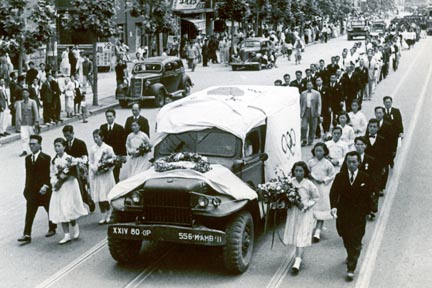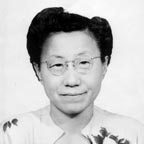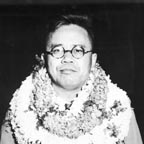
COURTESY ROBERTA CHANG / THE KOREAN NATIONAL ASSOCIATION IN HONOLULU
This 1947 procession honored Jacob Kyung Mu Dunn, who was killed in a plane crash. Dunn's remains, along with those of two other former Hawaii residents, were taken to South Korea yesterday by family members and will be buried tomorrow in the Daejon National Cemetery.
S. Korea to laud
isle liberatorsThree Hawaii Koreans will be
remembered tomorrow during
a public ceremony
They were long-distance liberators, fighting for Korea's independence while living in the islands.
CORRECTION
Tuesday, April 27, 2003>> Doin Kwon immigrated to Hawaii from Korea in 1905 to work at the Koloa Sugar Plantation on Kauai. A story on Page A3 in yesterday's early edition incorrectly stated that the plantation was on the Big Island.
The Honolulu Star-Bulletin strives to make its news report fair and accurate. If you have a question or comment about news coverage, call Editor Frank Bridgewater at 529-4791 or email him at fbridgewater@starbulletin.com.As early as 1912, two years after the Japanese took control of Korea, Doin Kwon and wife Hee Kyung Lee were collecting money and gathering support for the freedom movement.
Jacob Kyung Mu Dunn -- a favorite to become Korea's first president before his early death in a 1947 plane crash -- joined their ranks in the 1930s.
Even during their lifetimes, the three were revered as leaders in the struggle for their nation's freedom. Dunn died a national hero, and his funeral procession through Seoul attracted thousands.
Hee Kyung Lee Kwon: The Hawaii resident was part of Korea's underground resistance
But not until tomorrow will the Korean government recognize Dunn and the Kwons in a public ceremony.
Their ashes will then be interred at the Daejeon National Cemetery, "which is like the Arlington (National Cemetery) of Korea," said Dunn's nephew Scott.
"For me, there's a lot of significance," he said. "At least my son will have some ties back to Korea. There's a direct link to where he came from. To a certain degree, that's important."
Korea became independent at the end of World War II, some 35 years after the nation was occupied by Japanese forces.
The Republic of Korea was formed in 1948. But tensions during the Cold War between the United States and the former Soviet Union led to the Korean War in 1950, which split the Korean peninsula in two -- a division of north and south that still exists today.
Doin Kwon: He was a prominent member of local Korean independence organizations
Tomorrow's ceremony is part of a larger effort to honor all of Korea's patriots who lived overseas during the Japanese occupation.
In 2002, two former Hawaii residents who participated in the Korean independence movement were interred at the cemetery. Three were honored in 1998.
"Korea, at last, recognizes the contribution of Koreans in America," said Roberta Chang, a historian with the Korean National Association. "It would be like a closure for them to return."
Family members left yesterday to transport their relatives' remains to Korea and attend the remembrance. The Kwons had been buried in Honolulu. Dunn's remains -- which had been lost for years after being moved twice after his death -- were found late last year in a Catholic cemetery near Seoul.
Dunn, who immigrated to Hawaii with his family in the early 1900s, never became an American citizen despite spending most of his life in the United States.
His nephew said Dunn, who attended the University of Michigan and graduated with a master's degree in English, always hoped to return full time to his home country.
While in the islands, Dunn worked with the Korean National Association to gain support for Korean independence. He was the first Korean to speak on the "Voice of America" radio program about his nation's plight.
In 1947 he was appointed the Korean delegate to the Olympics. He died on his way to Oslo, Norway -- where he was hoping to convince fellow delegates to bring the games to Korea -- when his plane crashed into Japan's Mount Fuji.
"My uncle was one of the more powerful, influential men in Korea at that time," Dunn said. "He really died too early."
Doin Kwon immigrated to Hawaii in 1905 to work at the Koloa Sugar Plantation on the Big Island. He married his wife -- one of America's first Korean picture brides -- in 1912.
The Kwons quickly became prominent members in local chapters of Korean independence organizations. Doin Kwon, a maker of fine furniture and window blinds, funneled funds into the movement.
His wife was more hands-on. She was imprisoned twice by the Japanese for her connection to the underground resistance movement, once while carrying money to Korea in support of freedom fighters.
After participating in a nonviolent demonstration in Seoul on March 1, 1919, whose anniversary commemorates the independence movement in Korea today, she was sentenced to a year in jail.
"We are humbled by this extension of courtesy," said the Kwons' son, Nelson, who was selected to speak at tomorrow's ceremony. "We are thankful."


